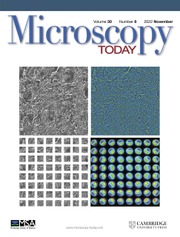The Microscopy Society of America, the Microanalysis Society, and the International Metallographic Society invite you to Microscopy & Microanalysis 2014 in Hartford, Connecticut. Hartford will be a great location for the meeting: it is a lovely town, full of historic buildings like Mark Twain’s home, it is within easy driving distance for northeast attendees, and it’s close to New York City for those of you would like to visit the Big Apple. This year is very special as we also welcome the Microscopical Society of Canada (MSC/SMC) and the International Union of Microbeam Analysis Societies (IUMAS). The latter organization will hold their IUMAS-6 meeting prior to M&M 2014.
Once again the latest and most innovative applications and instrumentation developments will be on show from investigators using microscopy and microanalysis techniques in the biological and physical sciences. The M&M 2014 meeting will feature two plenary lectures, more than 40 symposia covering a broad range of topics, numerous educational opportunities in the form of courses and tutorials, pre-meeting events including short courses, and a pre-meeting workshop on aberration-corrected electron microscopy.
In addition to the regular Microscopy & Microanalysis events, IUMAS delegates will enjoy a two-day pre-meeting congress and special social events. On the first day delegates will be able to select two half-day workshops from among twelve alternatives. The second day will bring together the delegates for plenary talks focusing on key microanalytical application areas. The IUMAS-6 meeting is the latest in the series of roughly quadrennial meetings organized by member societies of the International Union of Microbeam Analysis Societies (IUMAS). For more information, visit www.iumas6.org.
This year we are honored to have Professor Sir Colin Humphreys CBE from Cambridge University opening the meeting with the following inspiring plenary talk: “How cutting-edge atomic resolution microscopy can help to solve some of the world’s energy problems.” Prof. Humphreys has given public lectures on science throughout the world. His honors include national and international medals for his research using electron diffraction and microscopy, particularly for his work on GaN. He is also the author of the book The Miracles of Exodus and The Mystery of the Last Supper: Reconstructing the Final Days of Jesus. He was Knighted in 2010 for services to science.

Plenary speaker Prof. Sir Colin Humphreys.
Our second plenary speaker is Prof. Brian Ford, the world-renowned research biologist, author, and lecturer. He publishes on various scientific issues for the general public, and he has been a television personality for more than 40 years. One of his best-known discoveries was the original specimens of Antony van Leeuwenhoek. They were sent to the Royal Society of London in the seventeenth century and remained there until 1981 when Ford found the Leeuwenhoek specimens hidden in the letters. Prof. Ford’s lecture will be “Images from the earliest microscopes ever made.” A Fellow and Member of Court at Cardiff University, Prof. Ford is a former Fellow at the Open University, Visiting Professor at the University of Leicester, and a Member of the Senior Combination Room at Gonville and Caius College, Cambridge University, where he is currently based.

Plenary speaker Prof. Brian Ford.
In addition, this year we have a pre-meeting workshop on “Opportunities, Artifacts, and Interpretation of Quantitative Aberration-Corrected Electron Microscopy.”
This one-day pre-meeting workshop, organized by the MSA Aberration-Corrected Electron Microscopy (ACEM) Focused Interest Group, will be a forum for the discussion of the latest advances and solutions to problems associated with the application of aberration-correction technology, with an emphasis on quantitation. The format will consist of platform presentations by both invited and contributed speakers, together with a working lunch and poster session.
Dr. Oliver C. Wells (1931–2013) was a champion of all things related to the scanning electron microscope (SEM). He was Sir Charles Oatley’s second PhD student at Cambridge University to work on the SEM (after Dennis McMullan) and is considered one of the founding fathers of the field. His pioneering work and life will be celebrated in a memorial symposium bearing his name. He was a tinkerer and had a passion for electron detectors. He had great respect for the analyst who was knowledgeable about the SEM and who sought a plethora of information about a sample by varying all the controllable microscope parameters. He enjoyed discussing the SEM, always encouraged people to publish their work, and strove to give credit to individuals who were overlooked for significant work. He was also the grandson of H.G. Wells. He was MSA Distinguished Physical Scientist in 1992 and an MSA Fellow. In this memorial session, we honor Dr. Wells’s legacy by having papers on low-loss backscattered electron imaging, energy-filtered imaging, the origin of secondary electrons, new electron detectors, and reduction of sample charging in the SEM. Because Dr. Wells was one of the “fathers” of the SEM, the session is also intended to review the evolution of the SEM and show how the SEM has contributed to society as a whole.

Dr. Oliver C. Wells (1931–2013).
This year’s welcome event at the Connecticut Science Center will be a fun and informal get-together at a great venue. Catch up with friends and colleagues, make some new ones, and enjoy some delicious New England-inspired food (perhaps with some wine or local beer). The Executive Program Committee and the Symposia Organizers welcome you to Hartford for what promises to be a most wonderful experience. Each year the M&M meeting gets better. We aim to enhance and strengthen the societies that come together to share scientific knowledge. It is time to join and participate in your society (or societies).
Mark Twain wrote of the city of Hartford in 1868, “Of all the beautiful towns it has been my fortune to see, this is the chief.” The 2014 M&M meeting promises to be the chief meeting of the year. On behalf of MSA, MAS, IMS, (MSC/SMC), and IUMAS-6, we look forward to seeing you in Hartford, Connecticut!


